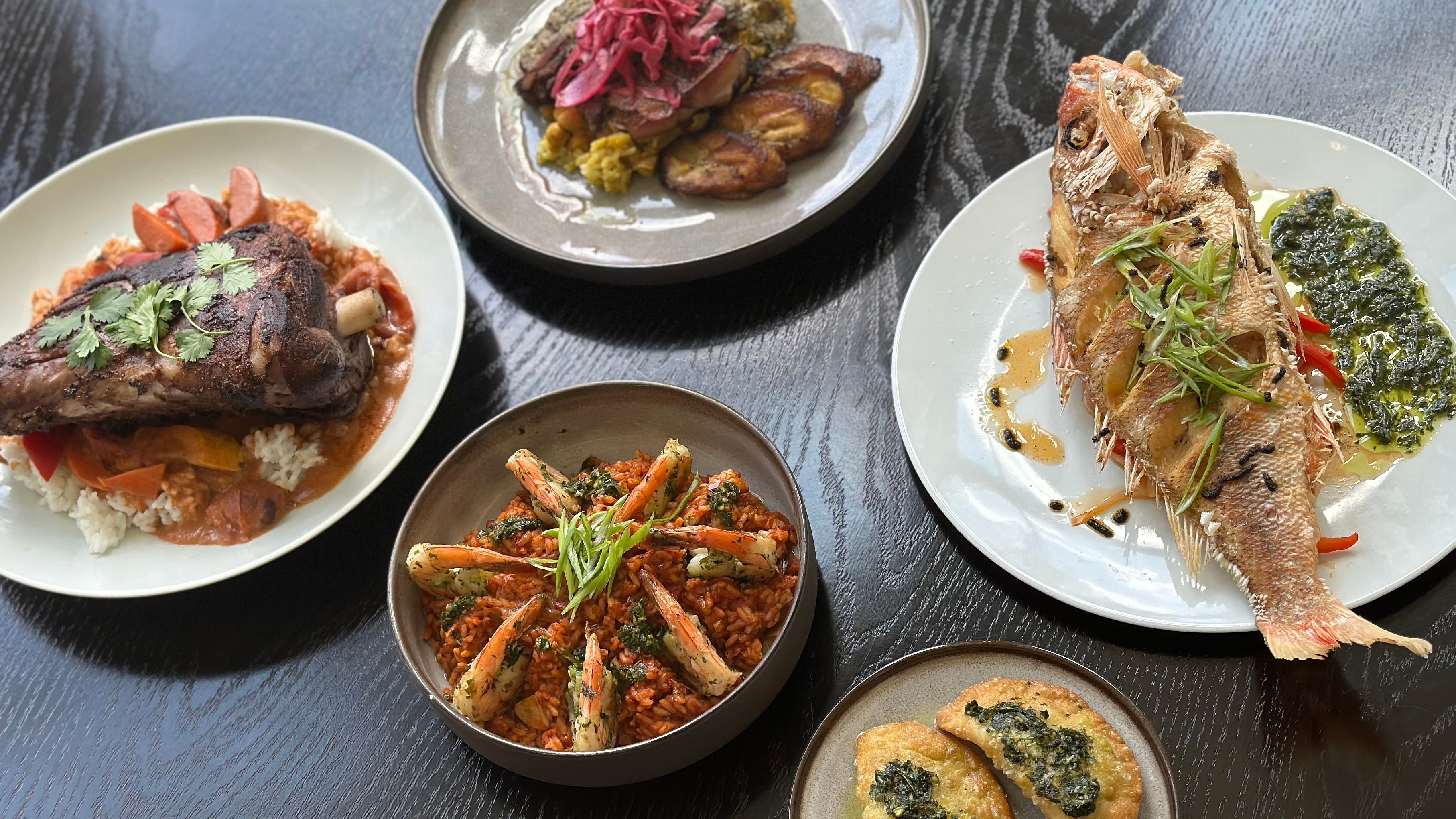“A sense of place.” It has been defined as “the experiential and expressive ways places are known, imagined, yearned for, held, remembered, voiced, lived, contested and struggled over.” It’s an evocative, sometimes elusive concept, especially for people of color in the United States, including the Indigenous Americans, African Americans, and Mexican Americans integral to the country’s foundation and development.
In short, this is home — but it’s never not been complicated.
This very American dichotomy so deeply intrigued Dr. Lezli Levene Harvell, founder of the Iconoclast Dinner Experience (IDE), that it inspired “13 Million Acres,” a traveling component of her acclaimed events series elevating chefs of color. Now in its second year, 13 Million Acres explores “the legacy of land loss shared by African-American farmers and Mexican Americans in the West.” Partnering with the renowned Montage Palmetto Bluff hotel and resort in Bluffton, South Carolina, this year’s event invites guests to explore the rich history and culinary heritage of the Lowcountry region as it takes flight from Saturday, Sept. 9 through Monday, Sept. 11.

Exploring the devastating effects of dispossession while celebrating emerging culinary talents is an ambitious undertaking, to say the least. As Harvell told theGrio, the concept for 13 Million Acres arose during research for another IDE franchise, the Webby Award-nominated podcast “Impolite Conversation.”
“I learned that between 1920 and 2012, farmland under Black ownership went from 16 million acres to 3 million acres,” Harvell explained. “I was like, what happened to the other 13 million acres?”
Consumed with the question, she turned to IDE’s multimedia platform to explore it through a medium that unites us all: Food. “What food does is it allows us to have this entry point to things that are more difficult to tackle,” she said.
The legacy of land loss is a commonality among marginalized populations in the United States. The often violent appropriation of land from Indigenous people of the country later rebranded as the United States is well-documented; similarly, there is growing awareness of the massive amount of land stolen from African Americans post-enslavement. However, the betrayal that annexed over 525,000 square miles of land once belonging to Mexican citizens is a less-discussed chapter in America’s colonialist history.
“I started researching … and I found out that after the Mexican-American War, what ended it was the Treaty of Guadalupe Hidalgo,” explained Harvell of the two-year conflict and ultimate resolution that helped create the southern border of the U.S. 13 years before the Civil War. “Under that treaty, people who were landowners would remain landowners even if where they lived got annexed by the United States,” she continued, “[but] once it’s signed, after the ink is dried, [the] U.S. government is like, ‘Umm, takesy-backies — only white people can own land in the United States.”
As a result, the Southern states — slave-owning states — expanded their territory to include Texas and portions of New Mexico and beyond, while, on a racial technicality, countless Mexicans were dispossessed of their land. It’s a loss that “can’t even be quantified,” said Harvell. It would also set the stage for the catastrophic clash between the Northern and Southern states over the right to enslave human beings — and foreshadow subsequent land grabs from Black Americans.
“These are taught as disparate events in American history, but really, they aren’t,” said Harvell.
“So, I thought it was interesting to look at [what] people think of as these two disparate moments in history as a continuum of each other … That was the impetus for the event.”

After launching in 2022 with a cadre of Midwestern chefs at Zingerman’s Cornman Farms in the Detroit suburb of Ann Arbor, Michigan, this year, 13 Million Acres highlights the history of Lowcountry, South Carolina. The three-day event begins with a Lowcountry Foodways Tour on Sept. 9 and culminates in the 13 Million Acres Dinner, both ticketed à la carte.
In addition to its rich culinary history, which includes rice, shrimp, oysters, grits, and other regional favorites, South Carolina is also historically recognized as the seat of slavery in the United States. Prior to the Civil War, South Carolina possessed the highest percentage of enslaved people, while the coastal city of Charleston was the largest port of the transatlantic slave trade. In recognition of that history, Harvell was not only intentional in choosing the Lowcountry but in hosting 13 Million Acres at the site of a former plantation.
“I was very specific in that I wanted my event in the South to be at a former plantation … and I know that that is triggering for some people. But to me, it is about having those uncomfortable conversations,” she added, “Lowcountry has a very particular cultural significance to it, and I specifically wanted to give them a sense of place.”
Comprising not one but 21 former plantation sites across a 20,000-acre stretch between Hilton Head and Savannah, Georgia, Montage Palmetto Bluff proved an ideal partner. While the shadows of chattel slavery and over a century of ancestral lands wrested from the resident Gullah Geechee population hang over the bucolic coastal destination, the resort is one of few area sites to openly acknowledge that disturbing history. With historians and archaeologists in residence, the land’s loaded legacy is explored, excavated, and shared with visitors, including the burial grounds of the formerly enslaved.
“I thought, what a great place to tell this story,“ Harvell explained. “Because when we talk about the connection to land, it’s difficult to do that in the South if you have a partner who is a little bit shy when you know there’s an elephant in the room — which everybody knows what this is. … I appreciated how the Montage is moving forward and claiming their history and their role in that.”
A local Black farmer also claimed his history at Palmetto Bluff. Grown on nearby Daufuskie Island and Turnbridge Plantation, Marion “Rollen” Chalmers’ rice is so renowned he has been granted a Carolina Gold Rice field at the University of Georgia’s Center for Research and Education. Possessing a rare talent for cultivating the crop, the fourth-generation farmer is also one of a select few to grow heirloom grains for chef-favorite Anson Mills.
“Rice is part of the story of South Carolina because anywhere from Charleston going back to Savannah, that’s where you had all the African-American slaves that they brought in farming these rice fields,” Chalmers told theGrio. “The fields that I grow this rice on [are] actually the fields that really resurrect the whole Carolina Gold rice thing in the United States and abroad … I am growing rice on the fields where this whole thing got started centuries ago.”
Chalmers is now a part of that storied history, farming on 97 acres purchased by his grandfather and maintained for three generations. But it was resident Palmetto Bluff archaeologist Dr. Mary Socci who directed him to the spot where his formerly enslaved great-great-grandparents are buried on the resort’s grounds.
“It’s mind-blowing to me,” he said. “When I found out about my relatives, my great-great-grandfather and my great-great-grandmother, husband and wife, buried in Palmetto Bluff. … I just stood there, looking at the headstone, and just couldn’t believe it.”
Now, in a turn that Harvell describes as his “ancestors’ wildest dreams,” Chalmers is not only compensated for a crop the enslaved people were once forced to cultivate, but in a full-circle moment, Montage Palmetto Bluff recently commissioned him to grow rice on-site for its restaurants. As the 13 Million Acres feast is served this weekend, he and his wife and partner, Frances, will be honored guests for the “six-course culinary journey.”

Seated with them will be this year’s honorary event chair, Simon & Schuster exec and former editor-in-chief of Bon Appétit magazine, Dawn Davis. This event’s “trailblazing Southern-based chefs” — 13 Million Acres’ “Class of 2023” — include host chef Daniel Vesey, chef de cuisine at Montage Palmetto Bluff’s River House; Bernard Bennett (Okàn, Bluffton); Luis Guevara (Carmel, Atlanta); Faye Poonsiripukdeekul (Bacchanalia / W.H. Stiles Fish Camp, Atlanta); Justin Pioche (Pioche Food Group, New Mexico), and pastry chef James Linabary (Audrey / June, Nashville). Carlos Marquez Hernandez (José, Dallas) will create cocktail pairings for the evening’s offerings. Notably, Vesey is the only white chef participating in the event, a choice as intentional as the venue.
“[T]he first course is always done by the host chef, and that chef has been white because it doesn’t help to have a conversation in a silo [or] in an echo chamber,” Harvell explained, later noting: “I want people to always challenge what they think they know.”
In keeping with event tradition, each chef will serve a course inspired by the region and a literary prompt chosen by Harvell. This year’s prompts include excerpts from Amanda Gorman’s inaugural poem, “The Hill We Climb”; “Conflict Resolution for Holy Beings” by the United States’ first Indigenous poet laureate, Joy Harjo; “Stone Mother” by Tanaya Winder; “Queen Sugar” by last year’s honorary event chair, Natalie Baszile; “Everything That Ever Was” by Tracy K Smith, and “Untitled Poem” by Beth Strano.
“Each chef is bringing their own personal connection to what land means to them,” said Harvell, adding, “So, it’s also a parallel story in that regard too, in terms of where are we going in terms of redemption as a country, and how the connection to land touches us all.”
Fittingly, Chalmers’ famed Carolina Gold rice will provide the dinner’s big finish, transformed into a dessert by Chef Linabary. In many ways, that transformation, rooted in tradition but made new, echoes much of the African-American experience, as Chalmers told the Grio.
“[A] lot of us that are actually in bigger cities now, living across the United States, most of these people actually came from somewhere here in Georgia or South Carolina,” he noted. “And we, as African Americans … if we have land that our family members have in these areas, we really need to really hold on to it — we do. Because it means a lot, and these people went through a lot to actually keep these properties that we still have today.”
13 Million Acres is at Montage Palmetto Bluff in Bluffton, S.C., from Sept. 9 through Sept. 11; last-minute tickets are still available. To learn more about the legacy of land loss in America, stay tuned for companion episodes on the IDE Impolite Conversation podcast.

Maiysha Kai is theGrio’s lifestyle editor, covering all things Black and beautiful. Her work is informed by two decades of experience in fashion and entertainment, great books, and the brilliance of Black culture. She is also the editor-author of Body: Words of Change series.
TheGrio is FREE on your TV via Apple TV, Amazon Fire, Roku, and Android TV. TheGrio’s Black Podcast Network is free too. Download theGrio mobile apps today! Listen to ‘Writing Black‘ with Maiysha Kai.

